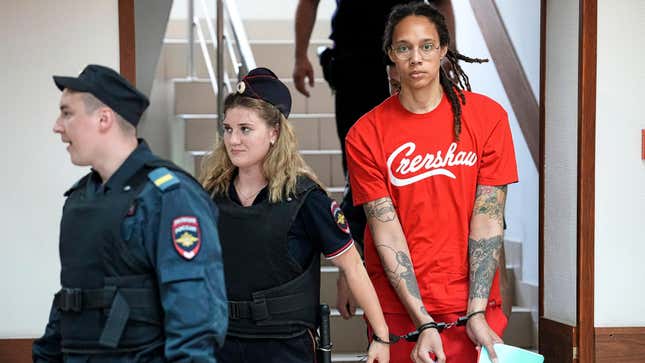Why Brittney Griner Pleaded Guilty
The WNBA star’s guilty plea is likely part of a strategy to get through the Russian court proceedings as quickly and comfortably as possible.
JusticePolitics

Brittney Griner, who has been wrongfully detained in Russia for 140 days, pleaded guilty to drug charges on Thursday, according to Reuters. However, she denied that she intentionally broke the law. Griner faces up to 10 years in prison if convicted, though Griner’s lawyer Alexander Boikov told reporters he hoped for the most lenient sentencing possible.
“I’d like to plead guilty, your honor. But there was no intent. I didn’t want to break the law,” Griner said during her second hearing, while a translator repeated her words in Russian for the court. “I’d like to give my testimony later. I need time to prepare.”
Though shocking and disappointing at first glance, Griner’s guilty plea was predicted, if not expected by a plethora of experts. William Pomeranz, the director of the Wilson Center’s Kennan Institute in Washington and an expert on Russian law, recently told ESPN that admitting guilt is traditionally the best defense in hopes of getting a lesser sentence, adding that there aren’t many significant examples of detainees who pleaded not guilty and were acquitted. The defense can object throughout the trial, Pomeranz said, but based on other detainee cases, it “rarely does and is rarely successful.”
Griner’s criminal trial began in July in a courtroom just outside of Moscow. Though Putin and Russian government officials have repeatedly said she is not a political prisoner, the U.S. officially recognized Griner as a wrongfully detained hostage in May. She was first arrested at a Russian airport in February for transporting trace amounts of cannabis oil in vape cartridges and is currently being tried on criminal drug smuggling charges. Russian prosecutors told the court last week that Griner knowingly transported a “significant amount” of cannabis oil, although the actual amount, as far as we know, is 0.702 grams or 0.02 ounces.
-

-

-

-

-

-

-

-

-

-

-

-

-

-

-

-

-

-

-

-

-

-

-

-

-

-

-

-

-

-

-

-

-

-

-

-

-

-

-

-








































